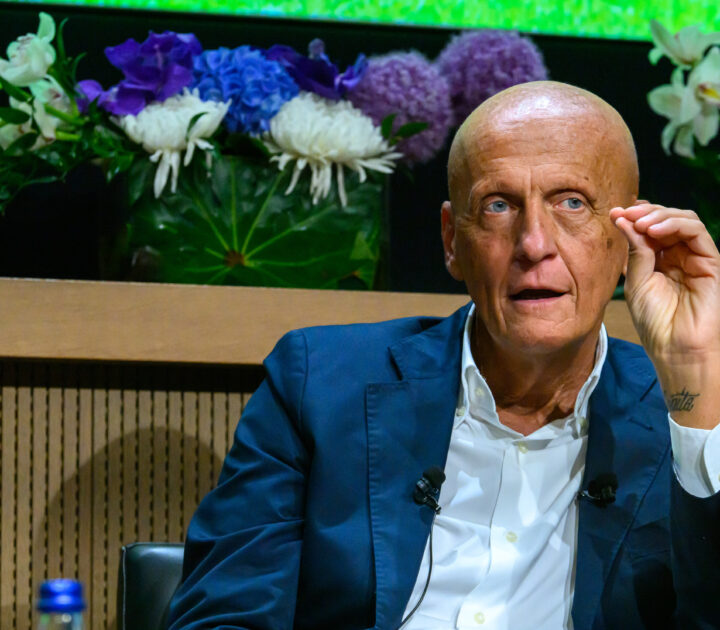
Sea change: how to make a sustainable global culture shift
In September 2013, shipping giant Maersk Line was facing an unprecedented organizational challenge. The company was about to enter into an alliance, dubbed the P3 network, with two other container behemoths, MSC and CMA CGM. As a result, Maersk was facing consolidation of its eight global liner operating centers (LOCs), as up to 70% of their work would be transferred to the new standalone organization. Pending approval from antitrust authorities in the EU, US and China, it was expected that P3 would go live in one year.
Keith Svendsen, vice president of Maersk Line’s operational execution, had the task of readying the company for the change. He was faced with a choice: make a top-down decision on moving processes to P3 and on the future of the LOCs; or completely reconfigure the operational engine to make the company work more smoothly in the future beyond P3.
In the end, his decision was clear. He realized that this was the perfect opportunity to prepare for long-term success. He developed his vision for turning Maersk into the ‘Toyota of shipping’, adopting the car manufacturer’s much-lauded manufacturing system, called simply the Toyota Production System, which focuses on employee behavior over actions.
This would demand a huge cultural change for more than 1,750 employees around the globe. Their daily work would transform from a firefighting culture executed by local heroes to a globally standardized culture based on global best practices and standard procedures. Svendsen wondered whether there was enough time and patience to pull it off, but in the end he realized there had to be. “Yes, there is a need for change, but it’s more than that. We make it our choice to change,” he said at the time.
The program begins
In January 2014, the Future Operations Execution change program was launched to embed TPS in Maersk. Svendsen had engaged a team of management consultants and together they decided to implement massive standardization in and between locations to reduce complexity. But far from simply imposing standards from above, Svendsen’s chosen course of action meant that he needed buy-in from everyone in the organization, from the bottom up. He knew from experience that he was looking at a minimum of two years of relentlessly embedding new behaviors into his management team.
At a management team meeting in Dubai in April 2014, Svendsen set out his vision with a simple example. He said: “We have decided that all teams should have a daily stand-up meeting in front of a visual board. This is not open for discussion. But now you and your teams must decide what the board will look like – a whiteboard, a screen, where it’s located. Call it an 80/20 standardization model, where 20% is your decision.”
In less than one month after Dubai, all 80 global execution teams had done this, each with a different look and feel. Standardization had been achieved, but the teams themselves had implemented it. The 80/20 rule had worked, at least in this instance.
Getting the systems in place
That wasn’t to say that everything was going exactly to plan. On June 17, 2014, the P3 alliance – the catalyst for the whole change program – was blocked by the Chinese antitrust authorities. However, because Svendsen had decided to take the long-term course beyond P3, the Future Operations Execution was still perfectly relevant. There was also relief that the LOCs were, for now, given a reprieve.
For the remainder of 2014, finalizing the basics of the new operating system was the priority. The global organization had already put the ‘hardware’ – standard work and performance management – into place successfully. Now it was time to get the ‘software’ – process confirmation and people and skills – to ensure long-term sustainability.
The change program’s focus moved to transforming management behavior with global leadership training. Managers were required to make personal commitments that linked their training with the new operational processes, for example, ‘to participate in two process confirmations with my team per day’.
By the middle of 2015, two thirds of the global leadership training was delivered. More than half of the company was working under the new operating system with a fully supportive management team. The ground work had been successfully laid.
The Future Operations Execution team has now done its job and has been dissolved. However, this is only the start of the journey for Maersk. The new operating system might be in place, but it is not yet universal. Maersk, and the whole industry, is under pressure from external disruption and a demanding market. But for the time being, Svendsen can bow out of the program confident that he has set the company on the right course.
Carlos Cordon is LEGO Professor of Strategy and Supply Chain Management at IMD. He teaches in IMD’s Digital Supply Chain Management program.
Research Information & Knowledge Hub for additional information on IMD publications
In that article I explained that modern safety leaders need more than just technical skills to survive in a VUCA (Volatile, Uncertain, Complex & Am...
Many executives say they don’t have time for mindfulness practices, such as daily meditation. An alternative is micro-presence: weaving moments of ...
The most successful executive teams can achieve outsized outcomes, but they can also be challenging to manage and be a part of. The author, a psych...
Technological innovation, advances in remote work, and reshaped post-pandemic priorities have led to companies hiring fractional leaders, or part-t...
In recent years, sustainable leadership has emerged as a powerful force reshaping corporate strategies worldwide. At its core, sustainable leadersh...
in Safety and Health Practitioner 29 January 2019
Research Information & Knowledge Hub for additional information on IMD publications
Research Information & Knowledge Hub for additional information on IMD publications
Research Information & Knowledge Hub for additional information on IMD publications
Research Information & Knowledge Hub for additional information on IMD publications
Research Information & Knowledge Hub for additional information on IMD publications
in I by IMD 5 July 2024
Research Information & Knowledge Hub for additional information on IMD publications
in HBR.org 2 July 2024
Research Information & Knowledge Hub for additional information on IMD publications
in I by IMD 28 June 2024
Research Information & Knowledge Hub for additional information on IMD publications
Research Information & Knowledge Hub for additional information on IMD publications
Research Information & Knowledge Hub for additional information on IMD publications





